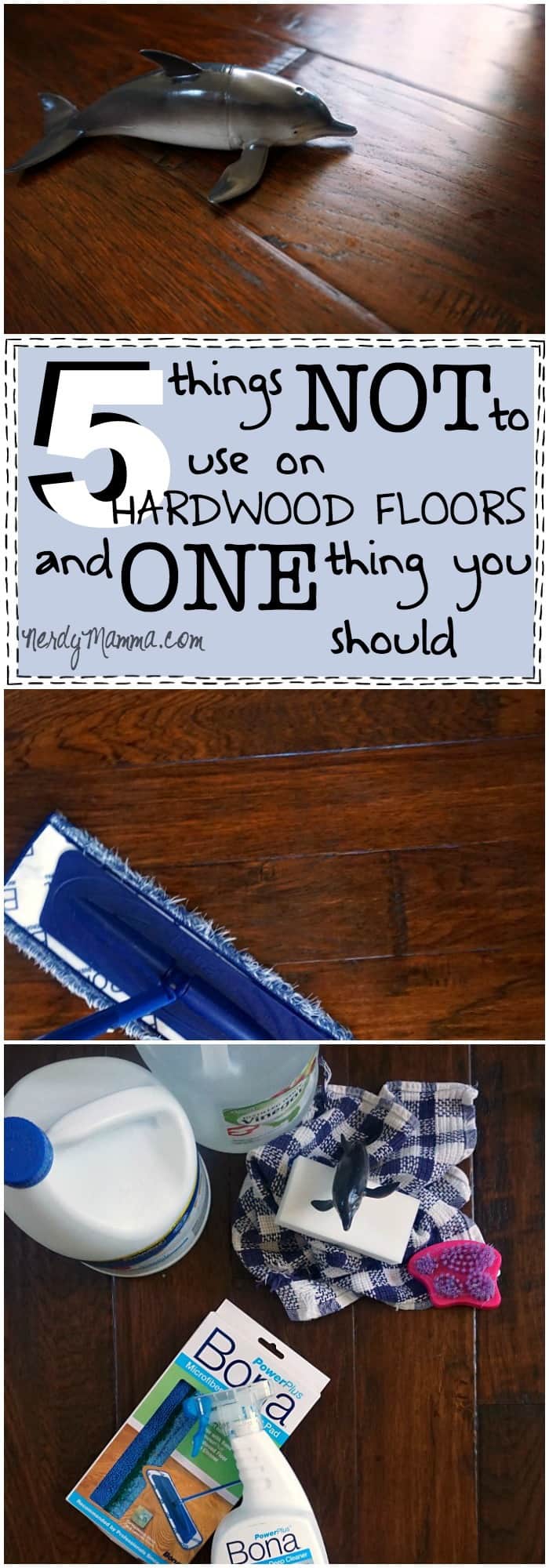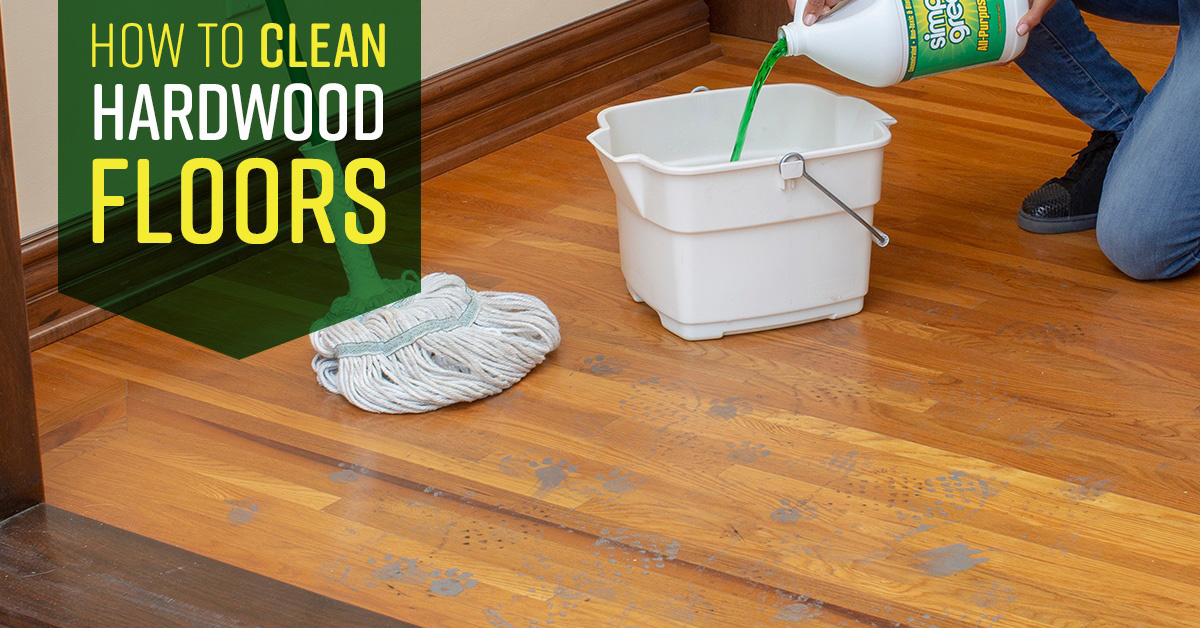Hardwood floors are a beautiful addition to any home, but keeping them looking their best can be a challenge. With so many different cleaning products available, it can be difficult to know which one is best for your specific needs. I recently embarked on a mission to find the best products for my own hardwood floors, and I learned that there are a few key factors to consider when choosing a cleaner.

Image: nerdymamma.com
In this article, we’ll explore the best cleaning solutions for hardwood floors, focusing on natural and DIY options as well as commercially available products. We’ll also highlight the importance of choosing a cleaner that’s suitable for your specific floor type and finish. So grab a mop and let’s delve into the world of hardwood floor maintenance together!
What to Consider When Choosing a Hardwood Floor Cleaner
Before jumping into specific products, it’s important to understand what makes a good hardwood floor cleaner. The ideal cleaner is one that effectively removes dirt and grime without damaging the finish or wood itself.
Here are the key things to consider:
Type of Hardwood Floor Finish
The type of finish on your hardwood floors plays a crucial role in determining the best cleaner. Here’s a breakdown:
- Polyurethane: The most common finish, polyurethane is durable and water-resistant. It’s generally compatible with a wider range of cleaners.
- Oil-based: Oil-based finishes offer a warm, natural look but are more susceptible to scratches and water damage. Use gentle cleaners with oil-based floors.
- Wax: Wax finishes provide a protective barrier but require regular maintenance. Avoid harsh chemicals or cleaners with ammonia, which can strip wax.
Type of Cleaner
Hardwood floor cleaners come in various forms, each with its own pros and cons:
- Diluted Vinegar: A natural and effective cleaner for most hardwood floors. Dilute white vinegar with water (1 part vinegar to 4 parts water) and test on a small area first.
- Commercial Hardwood Floor Cleaners: Many commercially available cleaners are specifically formulated for hardwood floors. Look for pH-neutral cleaners and avoid those with harsh chemicals or waxes.
- Soap-based Cleaners: Some soap-based cleaners can be used on hardwood floors, but choose those specifically designed for wood. Avoid dish soap or laundry detergent, which can leave residue.

Image: www.simplegreen.asia
The Best Cleaners for Hardwood Floors
Here’s a detailed look at some of the best choices for cleaning your hardwood floors:
Natural and DIY Options
For those seeking a natural approach, these DIY cleaners are effective and easy to make:
Diluted Vinegar
Diluted white vinegar is a natural cleaning solution that works wonders on hardwood floors. It’s effective at removing dirt, grime, and even sticky messes like spilled juice. Simply mix one part white vinegar with four parts water in a spray bottle, and spritz it onto your floors. For tougher stains, you can use a slightly stronger vinegar solution (1:3 ratio).
Baking Soda Paste
Baking soda is a gentle abrasive that can help remove tough stains from hardwood floors. To make a baking soda paste, simply combine baking soda with a small amount of water to create a thick paste. Apply the paste to the stain and let it sit for a few minutes before scrubbing with a soft cloth. Rinse thoroughly with water.
Olive Oil and Vinegar
This combination creates a natural cleaning solution that leaves your floors polished and shiny. Mix equal parts olive oil and white vinegar in a spray bottle. Spray the mixture onto your floors and let it sit for a few minutes before wiping with a soft cloth.
Commercially Available Cleaners
When choosing a commercially available cleaner, it’s important to select one that’s specifically designed for hardwood floors and to read the label carefully. Avoid cleaners that contain harsh chemicals, waxes, or ammonia. Here are some well-respected options:
Bona Hardwood Floor Cleaner
Bona is a popular brand for hardwood floor cleaners. Their products are pH-neutral and formulated to remove dirt and grime without damaging the finish. Bona Hardwood Floor Cleaner is a good all-around choice for most hardwood floors.
Murphy Oil Soap
Murphy Oil Soap is a traditional cleaner that’s often used on hardwood floors. It’s a gentle cleaner that’s effective at removing dirt and grime. However, it’s important to note that some experts recommend using Murphy Oil Soap sparingly, as it can strip the finish over time if used too frequently.
Rejuvenate Floor Cleaner
Rejuvenate Floor Cleaner is another popular option for cleaning hardwood floors. It’s a pH-neutral cleaner that’s designed to remove dirt, grime, and scuff marks. Rejuvenate also offers a variety of other cleaning products for hardwood floors, including a polish and a cleaner specifically formulated for high-traffic areas.
Expert Tips and Advice
Keeping your hardwood floors clean and looking their best requires more than just the right cleaning product. Here are some expert tips to help you maintain your floors’ beauty:
- Sweep Regularly: Sweeping your floors daily or every other day helps remove dirt and debris before it has a chance to scratch the finish.
- Use a Soft Brush: When sweeping, use a soft-bristled broom to avoid scratching the floor. A dust mop can also be helpful.
- Avoid Harsh Chemicals: Avoid using harsh chemicals, bleach, or ammonia on your hardwood floors. These substances can damage the finish and wood.
- Test in an Unconspicuous Area: Before using any new cleaner on your entire floor, test it in a small, inconspicuous area to ensure it doesn’t damage the finish.
- Use a Microfiber Mop: Microfiber mops are effective at cleaning hardwood floors without leaving streaks. Be sure to use a damp mop, not a wet one.
- Dry Floors Thoroughly: After cleaning, dry your floors immediately to prevent water damage. Use a clean, dry towel or a squeegee.
- Polish Regularly: Polish your floors regularly, at least every few months, to help restore shine and protect the finish.
FAQs about Hardwood Floor Cleaning
Here are answers to some common questions about cleaning hardwood floors:
How often should I clean my hardwood floors?
You should sweep or dust mop your hardwood floors daily or every other day to remove dirt and debris. You should deep clean your floors with a cleaner once a month or as needed.
Why is my hardwood floor sticky?
A sticky hardwood floor can be caused by several factors, including:
- Build-up of dirt and grime: Dirt and grime can accumulate on the floor, making it sticky to the touch.
- Residue from cleaning products: Some cleaning products can leave a sticky residue on the floor.
- Wax build-up: If you use a wax-based cleaner, too much wax build-up can create a sticky surface.
Can I use a steam cleaner on my hardwood floors?
While some steam cleaners are safe for hardwood floors, others can be too hot and cause damage. It’s important to check the manufacturer’s instructions to be sure that your steam cleaner is compatible with hardwood floors. Always test the steam cleaner on a small, inconspicuous area before using it on the entire floor. You can also opt for a steam mop specifically designed for hardwood floors.
What are the signs that my hardwood floors are damaged?
The signs of damage to hardwood floors can vary, but some common indicators include:
- Scratches: Scratches can appear on the floor’s surface from furniture, shoes, or other objects.
- Dents: Dents can occur from heavy objects being dropped or placed on the floor.
- Water damage: Water damage can cause warping, cupping, or buckling of the floorboards.
- Finish deterioration: The finish on your hardwood floors can deteriorate over time, leaving the wood exposed and vulnerable to damage.
What should I do if my hardwood floors are damaged?
If your hardwood floors are damaged, it’s important to address the issue promptly. For minor damage, like scratches, you might be able to repair them yourself using a wood filler or a touch-up pen. For more extensive damage, you may need to consult with a professional who can refinish the floor or replace damaged boards.
What Is The Best Thing To Clean Hardwood Floors With
Conclusion
Choosing the right hardwood floor cleaner is essential for keeping your floors beautiful and protected. Whether you opt for a natural DIY solution or a commercially available cleaner, remember to select a product that’s safe for your floor type and finish. By following these tips and using a gentle and effective cleaner, you can ensure that your hardwood floors stay radiant for years to come.
Do you have any favorite cleaning products or tips for hardwood floors? Share them in the comments below!





